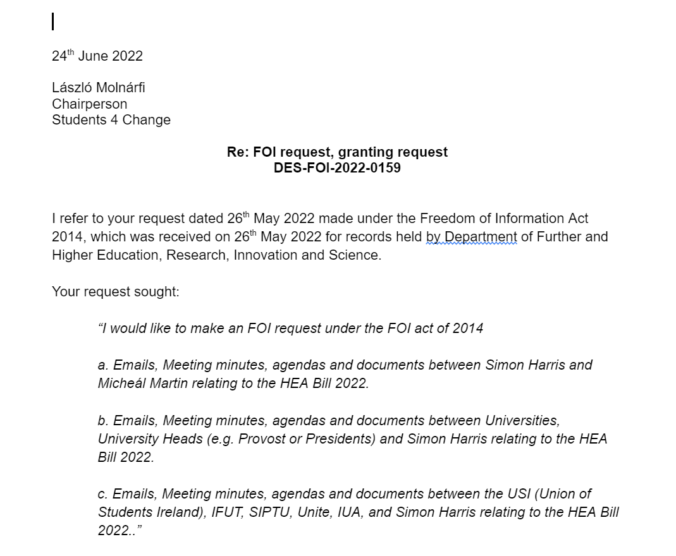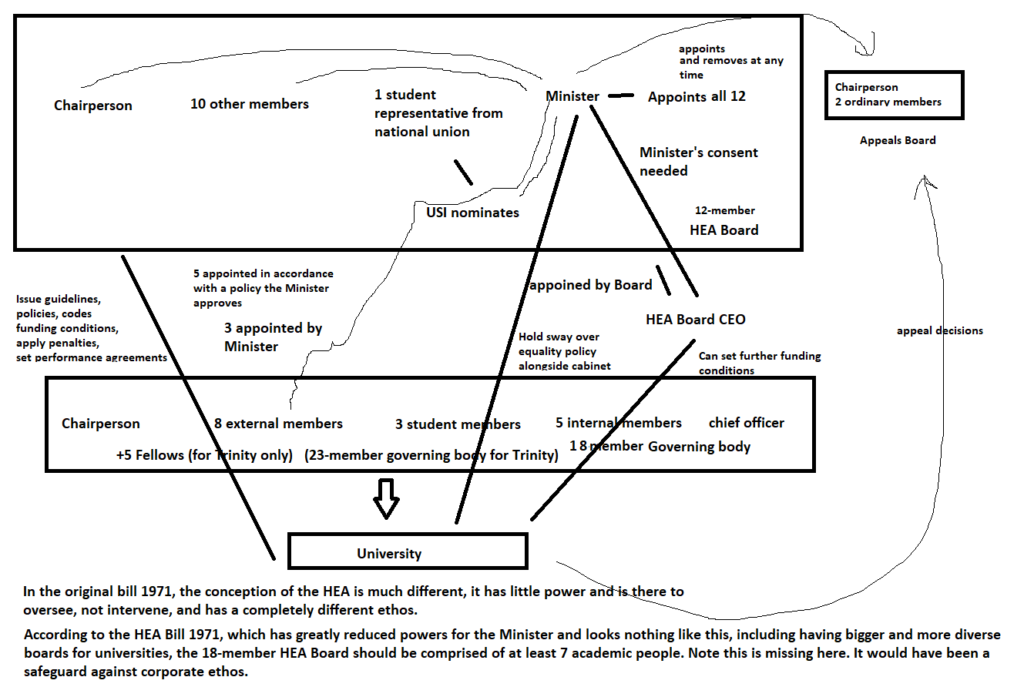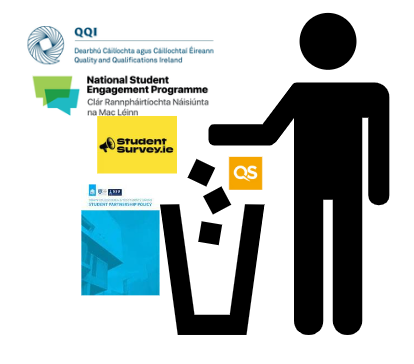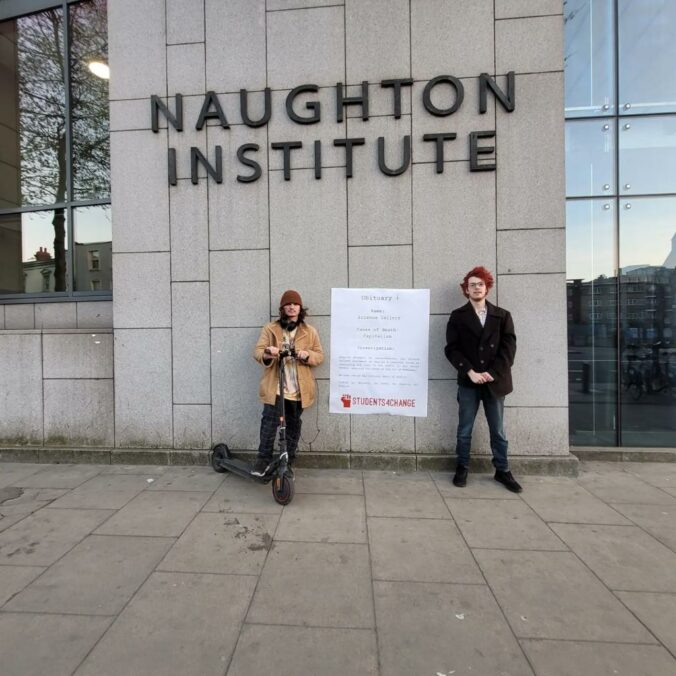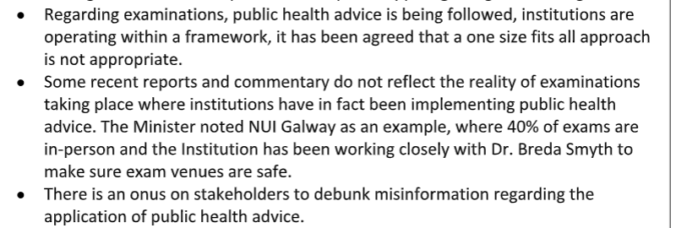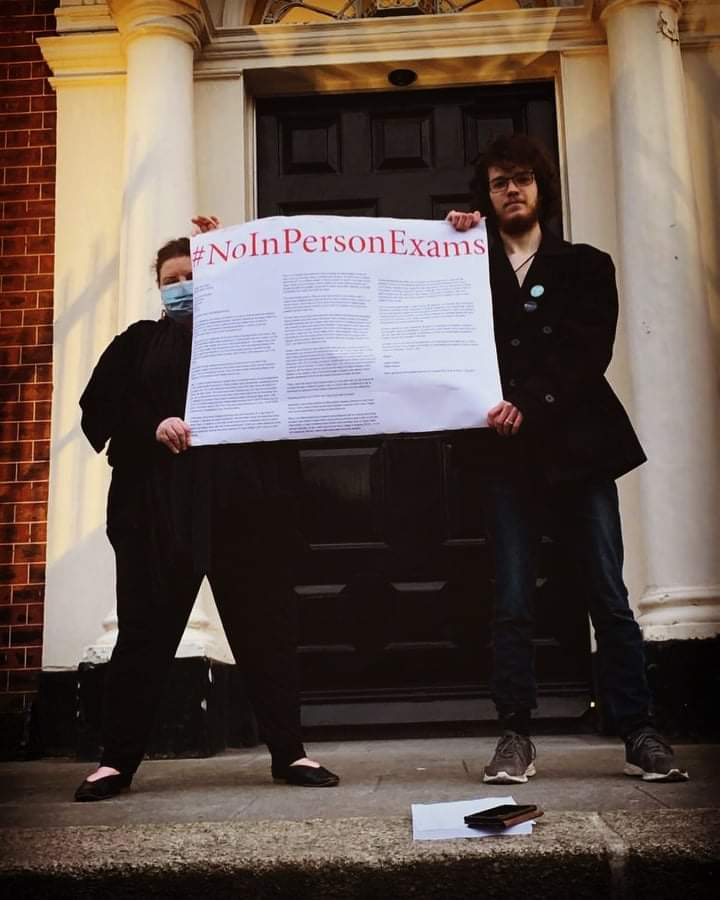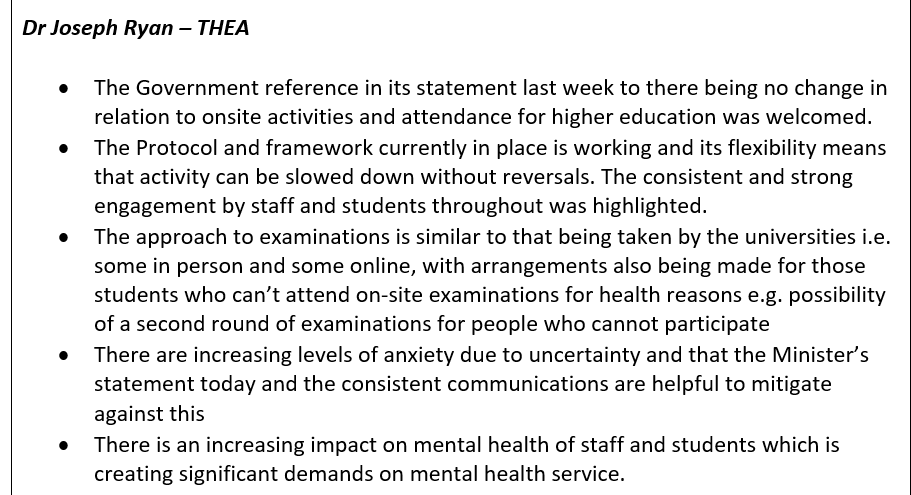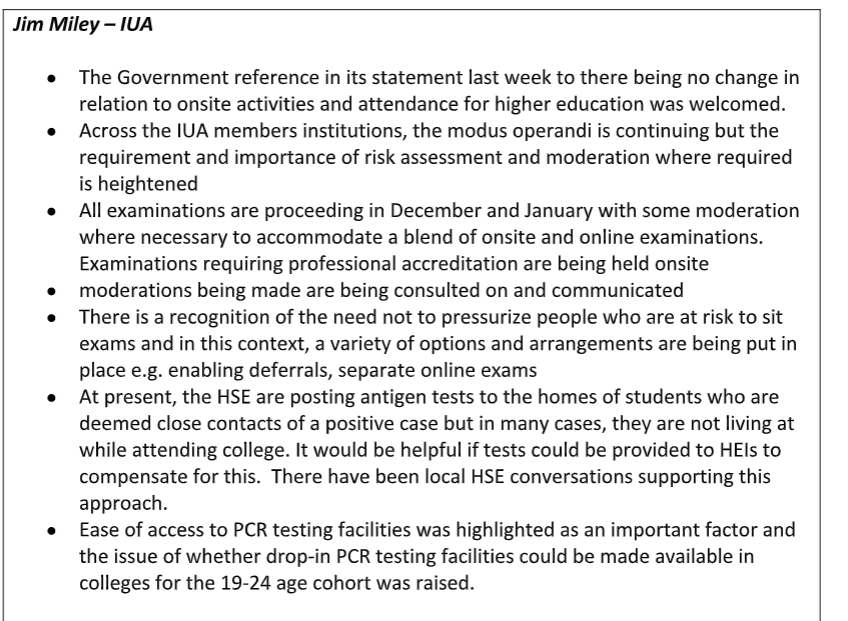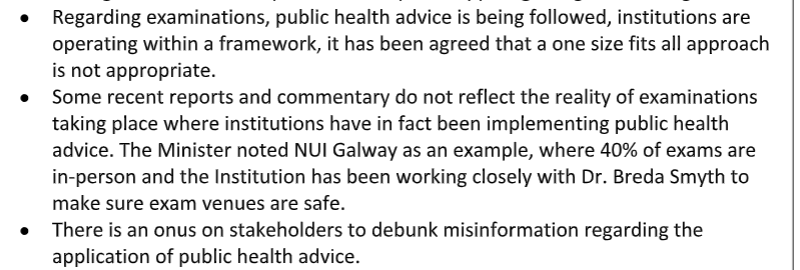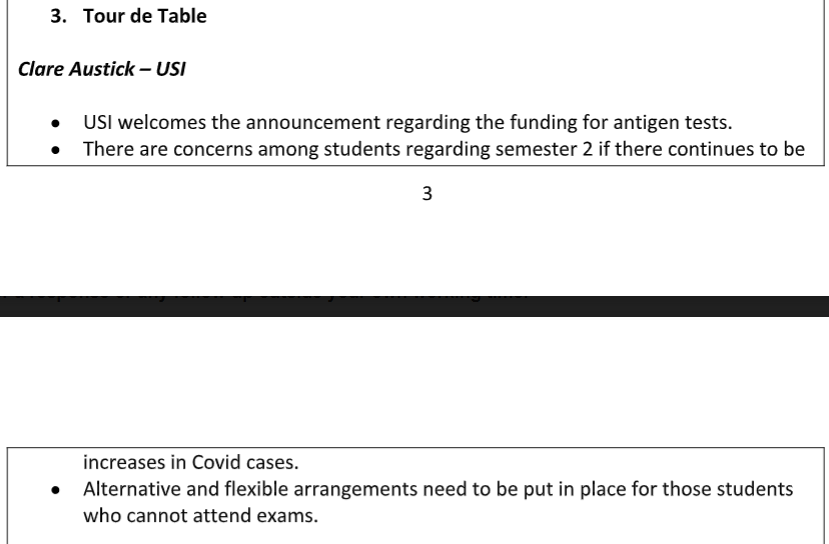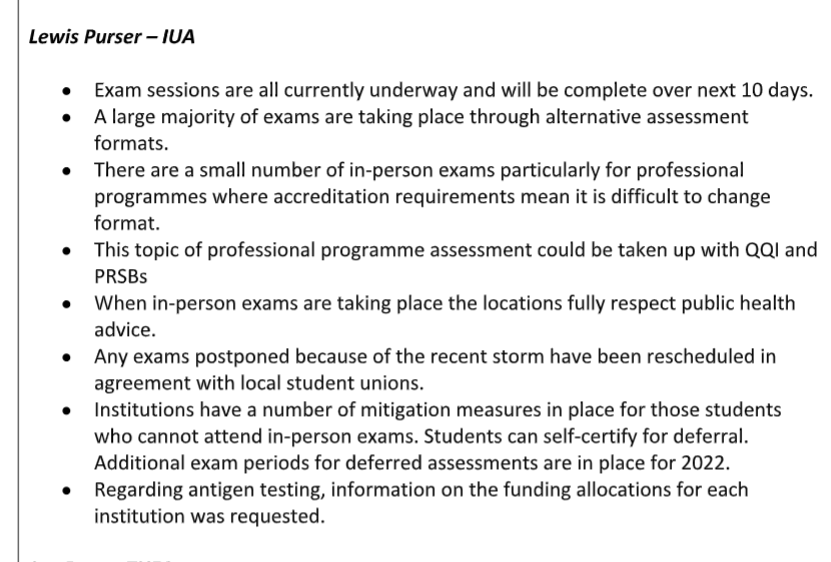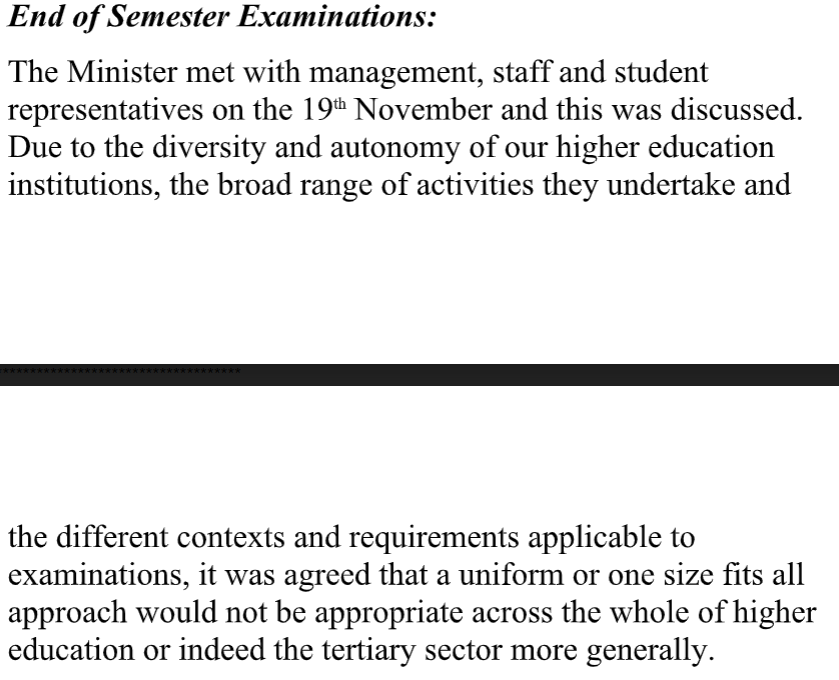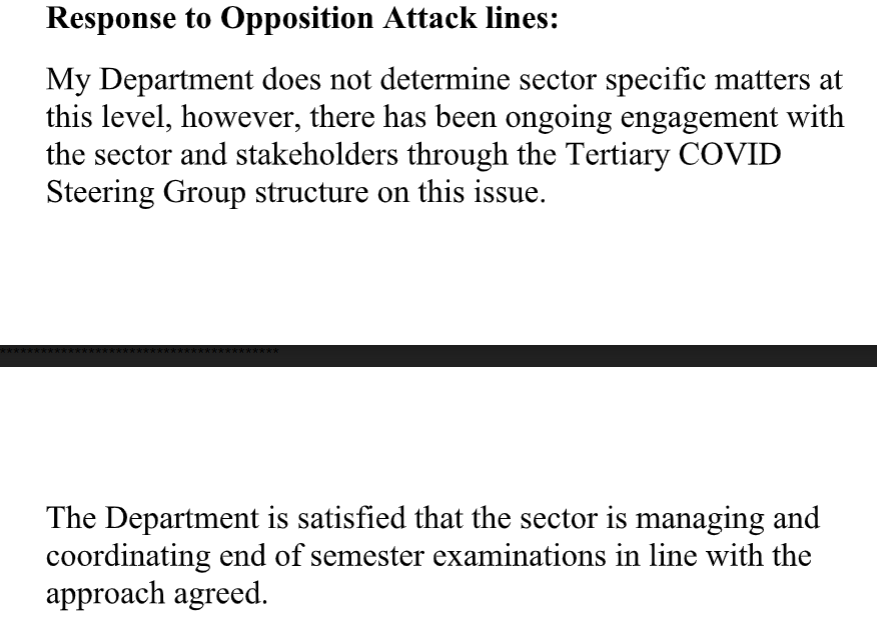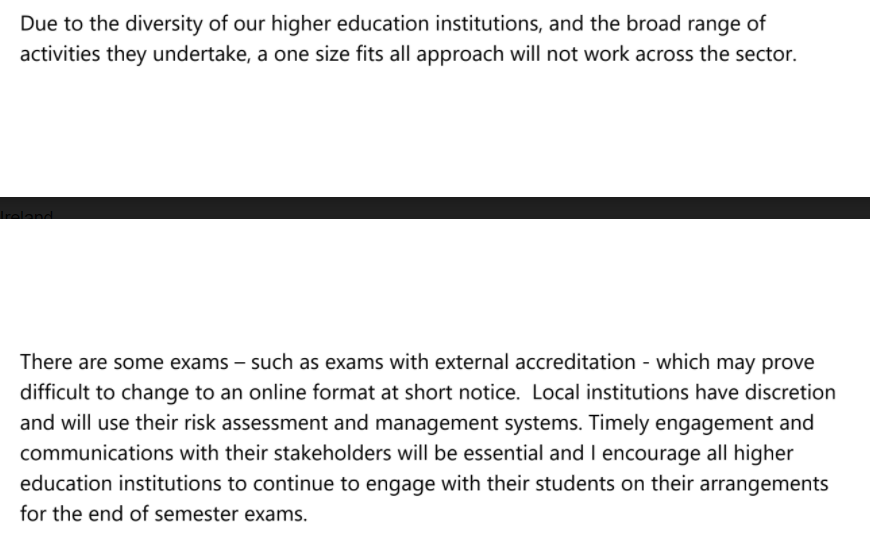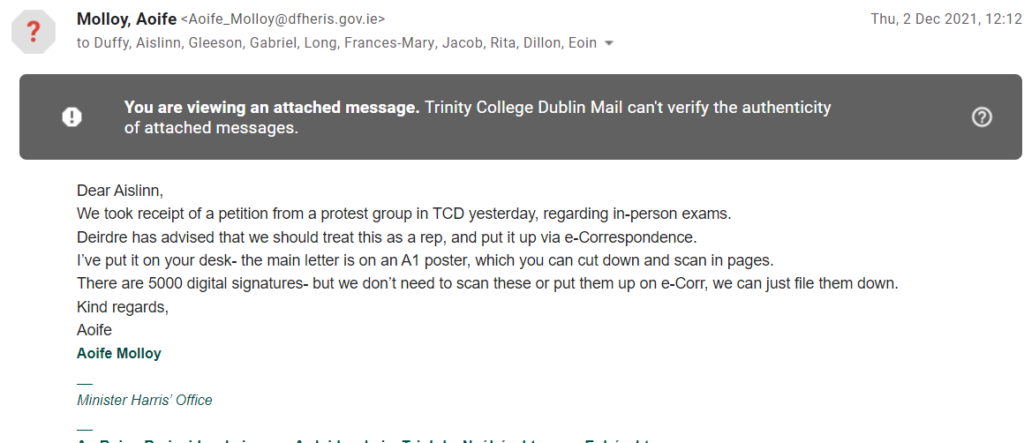In response to an FOI request submitted by Students4Change alongside the Trinity Graduate Students’ Union 23 documents were provided. These are engagements of University Leaders, USI, IUA and others in relation to the HEA Bill 2022. Virtually the whole sector is discontent with this bill. The HEA Bill 2022 was discussed in the Daíl last week on the 22nd of June 2022, where Deputy Rose-Conway Walsh proposed an amendment to include trade union representation on the HEA Board but this was rejected by Minister Harris. The bill will be discussed in the Seanad tomorrow (28/06/2022).
The documents include UCC and Maynooth calling the bill a “command and control” over universities, the IUA saying that aspects of the bill relating to how funding can be widthrawn and conditions set anytime by the CEO of the HEA do not “accord with natural justice and will prove unworkable”, and universities raising concerns that state control will lead to reduced EU funding. Interestingly, the Provost of Trinity College Dublin Linda Doyle is seen to not be as oppositional to the bill, and in one instance, talks about a possibility to “impose change on the Fellows through the statutes” and about how Trinity have convinced the community that smaller, competency-based Boards are needed. Minister Harris insists that the HEA Bill 2022 is a “comply or explain” system in section 136, which allows the HEA to issue codes, policies and guidelines to institutions.
The HEA Bill 2022 has been critizied for the shrinking of governing bodies to favour corporate, state and university leaders, for the composition of the appeals Board that is picked by the Minister, the sway of the Minister and their cabinet over the equality policy and other aspects. Trade union, staff and student representation will be reducted in favour of those not keen to upset the apple cart.
Please find the documents in our S4C FOI Drive. Below you can also find quotes from S4C and GSU, and also a timeline which describes these documents.
The bill remains a disgrace. Within universities, the HEA Bill 2022 is a power grab by bureaucracy over students and staff. On a national level, the HEA Bill 2022 is a power grab by the HEA over universities.
Trade union, staff and student representation will be shrunk in favour of state, corporate and university leaders on the governing bodies of our universities. On top of this, the HEA Board will stand as an unaccountable, Minister-dominated command-and-control body over our institutions. The apparatchiks of the Minister will sit on this Board, with only 1 student representative who the Minister can reject if they so wish, and the legislation even lacks the basic safeguard of the HEA Bill 1971 where at least seven of those on this board would have to be academic representatives. The centralization of power in the hands of the state should be of extreme concern to anyone who respects democratic principles.
The HEA Bill 2022 is a move towards a U.K.-style environnment for academia. What is happening is that the government is coming in, underfunding academia, and then will impose an austerity regime with their now-expanded powers. It is the height of the corporate fever to think that the way our universities are run has to do with not enough oversight by government officials, when in fact the failure of our institutions to meet targets simply comes from the decades-long underfunding of academia by the state. This is the same underfunding that has corporatized our institutions into for-profit companies. With the government only committing to half of what the 2016 Cassels Report asked for the sector, the situation will not improve. Precarity will increase, welfare supports will continue to not be funded and the logical conclusion of underfunding is that student loans might be introduced in the future, despite government promises. The neoliberal university is the same everyhwere.
It is a joke that a Minister is asking a democratic parliament to reduce democratic representation on governing bodies. Bureaucrats wrote the bill, with their corporate reasoning of “efficiency” and “competency”, to reduce governing bodies and tip the balance towards those who are not keen to upset the apple cart. The real bliss of this bill for bureaucrats will be that no more awkward questions will be posed at governing body meetings. The bureaucracy that will be dealing with will transform our universities into businesses, and what we will see is that subjects which make no money will be stripped, and further on we go into the neoliberal spiral. There are some competencies you cannot measure.
I would refer you to President Michael D. Higgin’s speech on the 8th of June last year. The academy is now a “winter”, as Max Weber, the great 19th-century social theorist, foretold. He spoke of the threat of a “spring that would not beckon with its promise of new life”, but would deliver instead “the threat of a winter of icy cold”. Weber prophesied “an iron cage of bureaucracy within which conformity would be demanded”.
Do not let us conform. This bill is an affront to our constitution and to our values.
László Molnárfi, students4change chairperson
Firstly as President of the GSU, I wish to express my total opposition to the HEA legislation and the unconvincing College counter to it. I have made it known at the Board of Trinity College meetings that I oppose it and I also wish for it to be noted that I have lodged my formal dissent to it.
The Bill is short-sighted and reactionary. It undermines our capacity to support students in these most troubled economic times and to dilute student representation, which has a long history within Trinity of confronting the challenges that students face and will continue to face into the future is unacceptable.
We will fight this at the Graduate Students’ Union alongside the Students’ Union and insist that the four student seats which are currently on the Board remain safe. A student can never have enough representation and I will continue to fight against these cuts on my watch.
I have met with numerous advisors and public representatives to discuss the HEA Bill and the Supplemental Charter and after vast consultation, I am convinced that the legislation leaves not only Trinity College without autonomy but our country without an autonomous university system. This is a sad result for civil society and it is particularly disappointing for Trinity College (a place with talented academics who have educated me and whom I admire greatly). Both the HEA Bill and the Supplemental Charter decimates the collegiate structure of the governance of TCD by undermining the role of the academic staff including their trade union members, professional staff and their trade unions, the fellows – this not only collectively impacts the student experience negatively amongst the college population but is unacceptable and a viscous attack on student welfare and the student voice. We are therefore convinced that the College response is not in the best interest of students and we state our complete opposition to the proposed HEA legislation.
I have met with democratic representatives of our national parliament and have found genuine support for our opposition. I have discussed the idea of democracy and its deliberate reduction through the proposed HEA Bill legislation and the distinct lack of opposition by College to the Minister. The Union agrees with some Fellows who are also of the opinion that this hurried decision to support the Minister in facilitating the reduction of representation at the Board by Trinity College is in direct conflict with our pre-independence charter which is binding on both parties in perpetuity. This is indicated in the US Supreme Court in the Dartmouth College case in 1819. The “surrender” charter of 2022 paves the way for the HEA Act and should also be rejected. The push comes from officers who have failed since at least 2018 to defend our historic charters which are binding in perpetuity. None of the items in either piece of legislation has been properly evaluated.
The attack on students in the HEA bill is defended by the Minister and has to be challenged. Apart from a small group involved with the Minister, I have not met anyone who supports reducing student representation. Students are the majority population in College. The Officers and the Minister promoting the legislation have a dim view of us. Those in our community who provide teaching labour as part of a research agreement are talented, able, and valued members of the governance (through representation) and education system. We have been utterly betrayed.
In consultation with representatives and various College fellows we have gleaned that that the Bill’s attack on Ireland’s only autonomous university and its royal charter is an action we promised at the Belfast/GFA not to do. After referendums in both jurisdictions we incorporated into Article 3 of the Constitution a commitment to respect the diversity of the traditions and identities on the island of Ireland. We take this o good stead to be the case. Trinity College Dublin has always been an all-island body serving both traditions and identities with a distinct legal identity. I doubt if the proposals of the Minister and the College would have made it through the east-west or north-south provisions of Belfast GFA or meet the legal standards of our partners to the Belfast GFA, namely the United Kingdom and the United States. We have discussed this at length and have taken advise form Sean Barrett amongst many others.
I have been asked to put forward my opinion, I believe that this is harmful legislation which will affect the Irish higher education landscape, Ireland’s reputation as a liberal tolerant modern democracy and, in particular, the reputation of Trinity College and our student experience and the value of our degrees as a result. I have already communicated my deep concern at numerous meetings and shall continue to do so: in a time of rising inflation, rising student fees (which we oppose as unacceptable) and a rising cost of living for our student population, losing any voice from College Board is unacceptable and we will continue to challenge this to the end.
Gisèle scanlon, president OF TRINITY GRADUATE STUDENTS’ union
Here is a timeline below which we have reconstructed with the documents provided from Minister Harris’ office.
5th of March 2021 (#1) – UCD writes to Minister Harris to fix the imbalance between funding opportunities for fundamental and applied research.
5th of March 2021 (#2) – IADT writes in a submission to Minister Harris that the HEA Bill is not pandemic-proof, and does not include learned experience from Covid-19. They furthermore say that there is no macro-view, no defined roadmap or vision to the bill. It is a bill lacking a national vision, which, if the bill were to be delayed, could be worked on with a proper consultation. The submission further states that the consultation process seems to have excluded direct feedback from key stakeholders. They furthermore mention that accountability and autonomy should be managed on an institutional basis and not on a sectoral basis, and criticises the use of penalties as a primary enforcement mechanism.
5th of March 2021 (#3) – Trinity Fellows write to Minister Harris say that the proposals in the bill would dismantle the democratic, diversity and competency of the bodies of College, most specifically Board. They argue against an external majority. The need to respect Trinity’s autonomy, a well-performing institution, must be protected, they say.
15th of April 2021 (#4) – Representatives of Trinity College Dublin met with the DHFERIS, where both parties expressed a wish to reach an agreement. DFHERIS said that they have been “intentionally silent” on Trinity in order to give them space to discuss issues specific to the College. Trinity said at this meeting that “TCD wish to arrive at a situation where the changes in TCD are framed in a private Act which is approved by the Fellows and linked to the legislation. The alternative is to impose change on the Fellows through the statutes” and “They have persuaded the TCD community that a smaller, competency based board is needed in Trinity”, despite this not being the case according to a University Times article from 2020 in relation to a similar proposal.
1st of December 2021 (#5) – USI raises the issue of student union autonomy as part of the HEA legislation in a meeting with Minister Harris.
16th of December 2021 (#6) – Minister Harris follows-up on earlier meeting with Trinity and agrees to an exemption.
12th of January 2022 (#7) – Provost replies to Minister Harris saying that after discussions with Board and Fellows, “while some opposition and reservations were expressed with aspects of the proposals”, there is a “sense that the proposals relating to Trinity may be generally acceptable on a consensus basis”, provided that the change is made via private legislation, and that this right is retained by Trinity.
18th of January 2022 (#8) – Minister Harris follows-up on USI’s queries regarding student union autonomy, asking them to forward any views, including “how student unions are currently established and governed and their relationship with USI and any interaction that USI has had to date with representative bodies such as IUA and THEA on how such matters might be advanced collaboratively”. He also promised a follow-up meeting. Furthermore, the Minister lays out in this email other student partnerships, such as QQI, StudentSurvey.ie and also Section 136 (to issue guidelines, codes and policies to universities) to help autonomy. Furthermore, he refuses to change the composition of governing bodies.
10th February 2022 (#9) – IUA requests a meeting with the Minister saying that certain aspects of the bill “such as those relating to the unilateral powers of the HEA CEO and the appeals process for actions or measures taken by the HEA require specific attention as we, we believe, they do not accord with natural justice and will prove unworkable” and they attach a list of amendments.
21st of February 2022 (#11) – IUA follows up on meeting request.
7th of March 2022 (#12) – UCC writes to Minister Harris to express “serious concerns” about the bill, and that “We are concerned that the draft legislation, if enacted, may interfere with the responsibility of the University to take the necessary decisions in teaching, learning and research. This is both an issue of academic freedom and of the autonomy of decision making which enables UCC to carry out its particular mission”. UCC says that the powers of the CEO of the HEA are not accountable, and that the compliance with guidelines, codes and policies will result in a ”command and control” system over universities. They also mention that the right of appeal is limited, and not independent. Furthermore, they mention that the HEA Bill 2022 under EU rules might reduce the overall capacity of the state to borrow, if Eurostat assess the proposed restrictions amounts to government control.
8th March 2021 (#23) – NCI requests to be included as HEI under the legislation.
9th March 2022 (#13) – IUA confirms a meeting with Minister Harris for the 14th of March.
25th of March 2022 (#14) – IUA follows-up and says that there are a number of issues that have not been addressed, such as the CEO’s power to apply any funding conditions, the lack of checks and balances before applying remedial measures, the independence of the appeals Board and others.
16th of May 2022 (#15) – UCC follows-up and stresses once again to Minister Harris’ that there is the threat of a “command and control” system over universities which mean that the doctrines of the HEA will become legally enforceable without being enacted in the form of legislation, and also stresses the issue of a need for a broader right of appeal.
16th of May 2022 (#16) – IUA sends Minister Harris UCC’s correspondence.
17th of May 2022 (#17) – Maynooth University sends Minister Harris email, saying that the HEA Bill will “erode the autonomy of institutions”, and that accountability and autonomy is insufficiently balanced. They also say that the current approach is a “command and control” system.
9th of June 2022 (#18) – Minister Harris replies to IUA and says that he believes that the bill has struck the correct balance between autonomy of HEIs and oversight. He rejects the IUA’s amendments in relation to “comply or explain” as opposed to “command and control”, saying that legal advice has been sought and it would not be appropriate to make the changes as requested. He also rejects an amendment by the IUA with regards to Board approval in respect of certain decisions, and approves a few and rejects a few others. Out of 7 proposed IUA amendments, he rejects 3 outright, rejects 1 because previous amendments were made, accepts 2, and adds 1 alternative amendment.
13th of June 2022 (#19) – Minister Harris replies to Maynooth University where he informs them that he is not making any further amendments to the “comply or explain principle”, saying that there are appropriate safeguards in place.
13th of June 2022 (#20) – UCD meeting with Minister Harris.
17th of June 2022 (#21) – Trinity Provost sends Minister Harris supplemental charter as agreed at Board on the 15th of June. There were 2 dissents at that Board meeting. Provost asks Minister Harris to check if there is anything that will conflict with the bill in this, to verify.
22nd of June 2022 (#22) – Minister Harris writes to USI that after legal advice, he is not in a position to agree to amendments relating to students’ union autonomy. He says student engagement is already guaranteed in the bill, and that section 136 (to issue guidelines, codes and policies) will be used to guarantee student union autonomy.
